Why I Wont Own a House Again
What You Own, Owns You: Minimalism For People Who Love Things
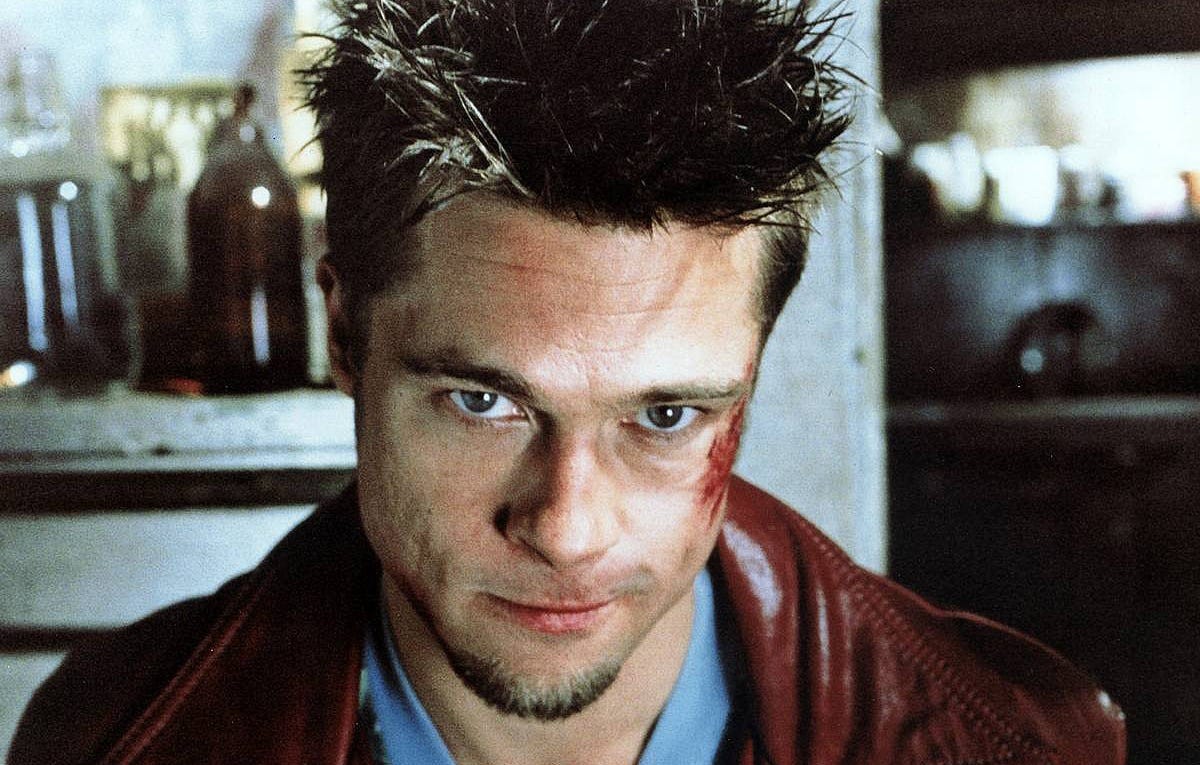
"You are not your job, you're not how much money y'all have in the bank. You lot are not the car you drive. Y'all're not the contents of your wallet. You are not your fucking khakis. You are all singing, all dancing crap of the world." ― Chuck Palahniuk, Fight Club
Radical acceptance is not easy. It can be tough to come to grips with the idea that the way yous have always viewed the world may not be working anymore. Merely that is no reason to not run into it differently.
I had to come to terms with the fact that the way that I was living my life was not fulfilling me. I had to realize that the notion of success I had been chasing later for years was empty. Most importantly, I had to have that I alone was to arraign for the predicament I was in.
I was following the typical American path. Become the caste. The job. Move to the city. Get an apartment. I was on my way, or so I thought. I was then driven to succeed that I had lost focus on why I wanted to succeed. What was the whole purpose of working long hours, making a lot of money, and climbing the ladder?
Honestly, I didn't know. Information technology was merely the but thing I had ever known. This mindless living, left unchecked created massive anxiety in my life. I was lost. I didn't know what to believe anymore. And it was in this space that I found out nearly mindful living and minimalism.
Millions of people were dealing with exactly the aforementioned problems as I was and were doing something most it. They were taking back control of their lives and doing some pretty amazing things. Immediately, I was hooked. By living intentionally, I could pursue piece of work that I was passionate about while non giving up anything that brought me true value.
The American Un-Dream

The American Dream is shifting for millions of people. Jobs are collapsing; wages are stagnant, and even with all of our advances in technology, economic productivity hasn't increased.
Well-nigh people associate more money with more than happiness, due to the freedom they believe the quondam will bring. Notwithstanding, that is not the case. Every bit many people know, there is a limit to the economic utility (re: happiness) that money brings and that limit is around $seventy,000–fourscore,000 a year for couples. The number varies on the urban center, but the truth remains: Coin does not bring happiness.
In fact, the things you own, including that massive 30-year mortgage on your dwelling house, are more of a liability to your growth and happiness than assets to them.
Most people view the things they own equally assets. They expect into their cupboard or their living room and see valuable products that boost their cocky-worth. The flaw with this fashion of thinking is that things rarely requite us the kind of satisfaction we retrieve they will. In fact, the things you own could very well be the liability holding you back from living a life on your ain terms.
By post-obit their atomic number 82 and taking on the challenge to follow a more mindful life, you too could come to empathize just how much more control you can have over your fiscal and personal freedom. Here are some simple strategies that yous tin can implement today if you and then choose.
The Culling Wisdom of Living
"When information technology comes correct down to it, the challenge of mindfulness is to realize that "this is information technology." Right now is my life. And I take that." — Jon Kabat-Zinn
Minimalism, or mindful living, is not about owning nothing and moving to Walden Pond, however that wouldn't be the worst idea for most overwhelmed Americans living in debt.
Why minimalism is and so powerful is that information technology allows y'all to take more risks and exercise more of the things that you want because you lot have fewer things to pay for and fewer things to leave behind.
In other words, less becomes more.
It may be fourth dimension to take a good hard look at the path you lot are on, the things you lot spend your money on, and the manner y'all want to live your life because the world is irresolute and it may be fourth dimension to wake upwards and take back your freedom.
This lifestyle isn't for everyone, and that's okay. I'm not trying to sell yous on anything, but just show you that there is another way.
Sustaining The Status Quo
Once upon a time, at that place was a swain named Billy.
Billy was a 28-year-old corporate employee living in Chicago. An expensive city, but definitely doable at nearly income levels if you are resourceful enough.
Currently, Billy works an 8 to 6 job in finance making $150k a year. He doesn't hate his job, but he has always wanted to start his own business concern one 24-hour interval and just hasn't always taken the leap. He has always promised himself that he would ane 24-hour interval, but over time, equally his salary increased, he began to feel more than and more fear about leaving the security.
"I think everybody should go rich and famous and practice everything they ever dreamed of so they can see that it'south not the answer." — Jim Carrey
After saving upwardly $100,000, he and his married woman just bought a 2-chamber condo in one of the nicest areas of boondocks. Although the down payment used up most of his savings, they viewed the purchase as an "investment" and felt similar it was the best move for their phase in life.

On top of the new condo, they also had to buy new furniture to make the place feel similar dwelling. And so, they bought a bed, a couple couches, and some cute, and expensive, artwork to articulate their unique manner.
Once the down payment and all of the furnishings were paid for, Billy had very footling left in his personal savings account.
This would've been a perfect time to start that business concern he had e'er dreamed of, but now, with the new condo and increased living expenses, he tin no longer have the chance.
Billy, just like near overextended people, finds himself working to live. He has to stay in a high paying task that has long hours to pay for the lifestyle he believes he needs to be happy.
Without ever checking this logic, Billy will continue living a life of quiet desperation — unless he takes action to stop this mode of doing and starts intentionally "being" something new. He must offset living intentionally where his lifestyle and expenses revolve around the way he wants to live in the world (task, location, freedom, etc.), instead of mindlessly increasing expenses to match his salary.
He may never get out of this cycle. He may find himself, years from now, working to live, and failing to ever alive intentionally. Worst of all, he may never start that business organisation he always dreamed up, considering of the gilt handcuffs that lock him into a high paying job to pay the mortgage.
There Is Another Way
"The time to come is already here — information technology's just not evenly distributed." — William Gibson
Now, on the other side of town, Jackie is sitting at a coffee shop contemplating what to do next with her life. Jackie is 33. She has been working in marketing for almost a decade and is completely burnt out.
A couple years ago, she bought a 1-bedroom condo when the "marketplace was hot," believing, like Billy, that buying a dwelling house was a skilful investment. Yet, over the years of paying a mortgage and losing her life savings on the downwardly payment, she is becoming more aware that the platonic of owning a home is less appealing than she idea, due in part to her realization that she doesn't actually own the abode, the banking concern that lent her the coin does.
Jackie is single and like Billy, she has e'er dreamed of living a life on her own terms, with the freedom to pursue her artistic interests. She has grown tired of the "grind" and wants to break costless. Jackie tells her friends that she wants to live intentionally, and honestly, dedicating herself to something that matters.
Later on reading a couple books on minimalism and the gig economic system, she was hooked. Although she doesn't see herself as an obsessive consumer, the idea of financial freedom and living a life on your own terms captivated her.
That'south what I desire, she tells herself, afterwards completing the documentary Minimalism on Netflix. I want to live an intentional life, where I tin work on things that I care most and not be strapped down considering of the things I ain.
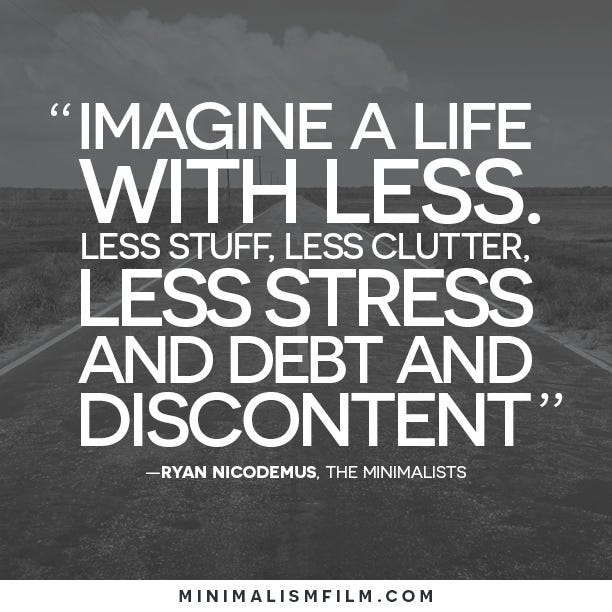
She pulls out a journal and starts writing:
- I want to exist able to travel without worrying almost paying my mortgage.
- I want to take time off whenever I desire to, instead of meticulously planning my PTO days effectually the visitor schedule.
- I want financial liberty AND professional purpose that are driven by a new fashion of being in the world.
With her terminate in mind, Jackie started taking a ruthless center to everything she owned — and what she found astonished her. She realized that most of the items in her home added no true value to her, or would add no value to the new life she was planning.
She was shocked by how much stuff she had accumulated over the years of "not really being an obsessive consumer." This realization led to another empowering insight: Jackie could sell all of the things that didn't add value and make some extra cash to fund her new journey.
A win-win.
The biggest expense (and liability)was her abode (re: mortgage). She had bought the business firm because that is what "yous are supposed to practise." Information technology didn't bring her whatever more joy than renting a place, so she called upwards a realtor friend and put it on the market.
If she could sell her dwelling, she would have a large "safety internet" to fund her newfound liberty until she got her new business off the ground. For the first time in her life, Jackie was making the determination to live her life intentionally.
Within days she had sold eighty% of her possessions and had an offer on the house. Once she sold the house, she would finally be "complimentary" of everything that had been holding her dorsum from living the life she wanted.
Prior to this, Jackie and Billy had viewed their possessions equally avails, or at the to the lowest degree, value adds to their lives. But after ruthlessly analyzing each item, they understood that, in fact, what they owned them. Their and so-called assets had get liabilities that were keeping them tied downward to a life they didn't want.
Lower Your Overhead
"The truthful value of a human being being is determined primarily by the measure and sense in which he has attained liberation from the self." — Einstein
Any business concern owner knows that increasing your overhead is bad for your bottom line and can stagnate growth. Just nosotros as individuals rarely look our expenses this fashion.
Nosotros attach too much pregnant to things and therefore lose sight of what they actually are; jumbled-upwardly raw materials meant to give the feeling of substance, only without ever really doing so.
We are emotional nearly our purchases, irrationally believing that the wearing apparel on our hangers and the mortgage with the banking company somehow bring happiness and security that we then long for. On the reverse, these are the very things that are decreasing your life'southward "net-margin."
Loads of books and blog posts take been written virtually how to become more mindful and intentional with your life. Some focus on the spiritual side of things. Others focus on the organizational side of things. And some focus on the financial liberty side of things.
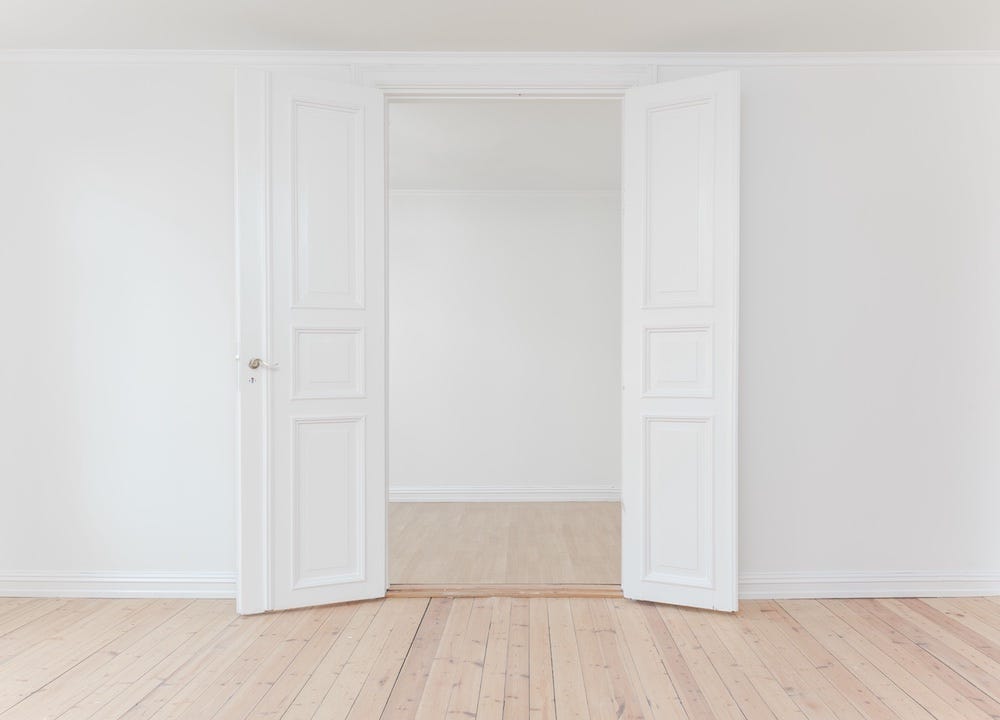
I won't belabor the point hither because the act of condign a minimalist is in itself very like shooting fish in a barrel. It involves looking at your life through the lens of fulfillment rather than accumulation. It requires you to be ruthless with your ingrained logic and analyze whether the style you are living and consuming is adding value to your life.If it isn't, then y'all need to inquire yourself why are you lot standing to do it.
All of these things are simple, but not like shooting fish in a barrel. It requires a mindset shift, a reexamining of innate behavior and a reorganization of priorities.
If I told you that forgoing that new wardrobe now would allow y'all to retire early on and pursue your passion for teaching yoga, would you still make the purchase? My guess is that you probably wouldn't, or you lot would at to the lowest degree take a long hard wait at the benefit the new wardrobe would bring you earlier swiping your card.
The problem is, we rarely look at our life -specifically our purchases -in totality like this. This creates a life in which we work to pay for our expenses versus mapping our expenses to how we want to piece of work.
Minimalism offers an culling to this thinking. And information technology isn't want you call up. Throwing abroad the things that don't "spark joy" is a smashing concept, but if you are merely going to buy a new wardrobe next season, it doesn't really change much. If you are but focused on the number of items you own, and then yous are missing the point. It'south about practice, not theory.
Allow's map out a couple of like shooting fish in a barrel steps to become you lot started, even if you think you lot "could never" be a minimalist.
Strategies For People Who Dear Things
"It's merely later on we've lost everything that we're gratis to exercise annihilation." ― Joshua Fields Millburn
- The Laundry Micro-Purge (Area: Things)
The biggest hang-up virtually people accept starting out is that they effort to do it all at once and become overwhelmed. Simply similar any other skill or addiction, mindful living takes practice and time for it to go ingrained. So, I suggest you kickoff minor with what I like to phone call the micro-laundry purge.
Here's how information technology works. The next fourth dimension you have a full basket of laundry, become into your cupboard/dresser and see what is remaining. Almost of us recycle the same 20% of clothes lxxx% of the time, therefore the things in your hamper probably constitute the items of clothing you virtually often vesture This means what is left are things y'all most likely haven't worn in months, if not years.
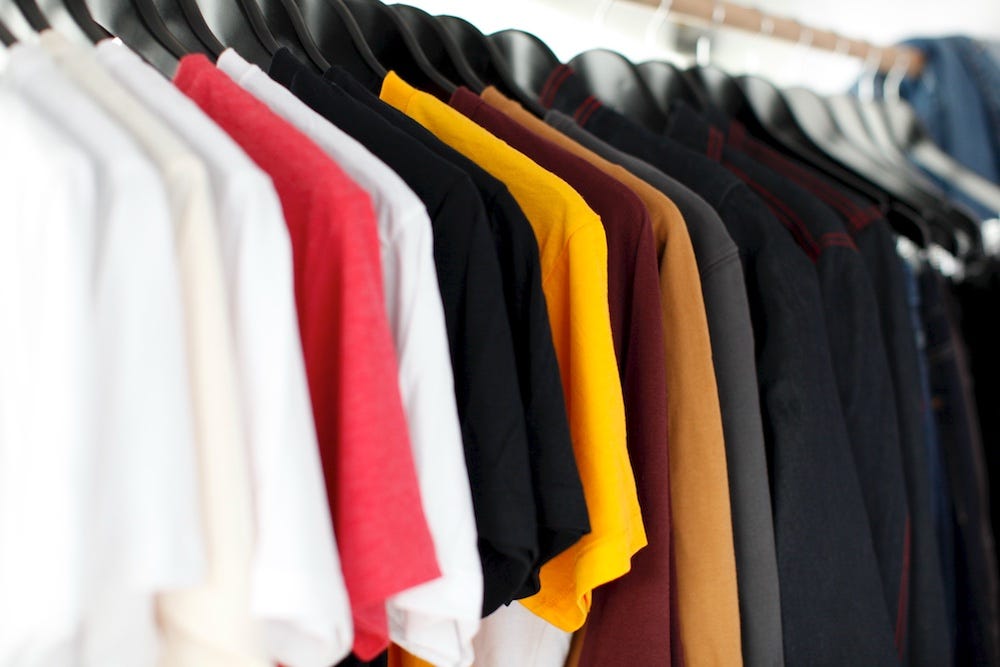
This is where you start.
It may be hard, but before doing your laundry selection out ane section of clothes (e.thousand. t-shirts, shorts, pants, etc.) to purge. Accept the time to pull out each individual piece and lay information technology on your bed or flooring, making certain that you can see each slice separately from the others.
Adjacent, selection upwardly each piece and ask yourself these questions:
- Could I make money if I sold this particular?
- When was the final time I wore this item?
- What is one reason that would make information technology reasonable to get rid of this item?
If you still feel like you need to keep this item, great, put information technology dorsum in your cupboard or dresser and move on to the next. The purpose of this exercise, at least initially, is not to throw out all of your things, but to get-go becoming aware of the things you own and appreciating them more.
If you lot are on the contend, set up a 3-month box, where you keep items that you lot are unsure about to see if you will employ it in the next iii months. If you lot don't, toss information technology.
Your goal on the get-go get effectually should be to sell/donate at to the lowest degree 1 item. Then commit to doing this practise each time y'all do laundry. It should take all of v–x minutes and will be a great way to outset ridding yourself of unnecessary things that could issue in you making some extra cash.
two. The Little Blackness Volume Technique (Expanse: Finances)
If you are anything like me, personal finance is rarely at the top of your mind. I used to recollect that my finances would piece of work themselves out and that I would innately exist able to tell if I was spending too much. This method quickly stopped working when I moved to New York and started making 50% less than I was in a cheaper city.
At first, I did what most people do when they embark on the personal finance rabbit hole, I created a budget. Inevitably, this strategy failed to0 because it was also much work to continue track of and tag every expense.
I knew financial freedom was the ultimate goal, so I kept working out new means to assist me control my expenses and that is when I came upwardly with the Niggling Black Book Technique.
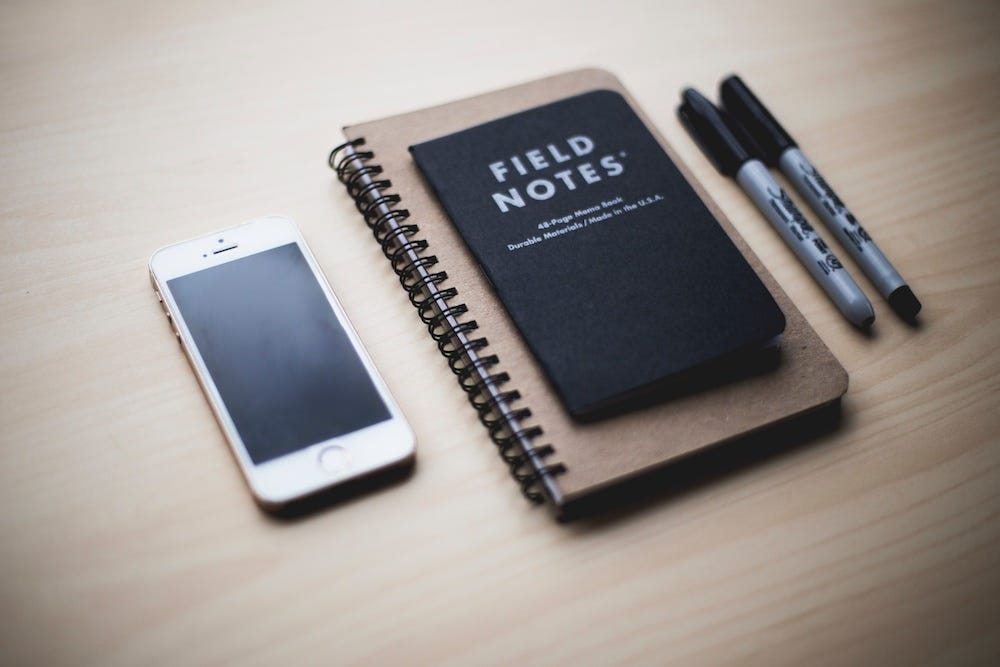
The LBBT is so unproblematic you may remember it won't work for you, simply I promise information technology will. Everyone I take told about this strategy has concluded up making it office of their daily routine considering of the power it gave them over their expenses. Retrieve, you can't always command your income, but you can control your expenses.
How it works:
Borrow/Buy a small-scale notebook that tin can fit in your pocket.
For ane day, runway everything you purchase in this notebook.
Write out what you bought, where you bought it, how much information technology toll, and why (e.chiliad.. "I was hungry").
At the end of the day, total up your expenses and carefully look at each line detail and ask yourself these questions:
Why did I need to buy this item?
Is what I bought still making me happy?
How could I have avoided spending money on this detail?
Did this purchase remove a hurting from my life? It is well known that removing hurting offers more than satisfaction than adding excitement.
Like the Micro-Purge, the purpose of this single-day strategy is to make you mindful of your spending, and more importantly, the story of why you consume things. Effort this strategy for one day and if yous enjoy it, think about doing information technology for a total calendar week. It may radically modify your money mindset, which in turn could change your life.
3. The Minimalists Flywheel (Surface area: Mindset)
A flywheel is a mechanical device that resists alter. It takes a lot of energy to get a flywheel moving, but in one case you do it is hard to get information technology to finish.
This is a bang-up metaphor for transitioning to a minimal, mindful living mindset. It can be hard to change your fashion of thinking, but in one case yous go the flywheel moving it becomes hard to go dorsum. The main reason humans have such a hard fourth dimension getting rid of things is that of two psychological factors: Loss Aversion and Identity Investment. If you tin learn to be aware of your biases, and movement past them, yous volition be well on your style to getting the minimal flywheel moving.
The master reason humans have such a hard fourth dimension getting rid of things is that of 2 psychological factors: Loss Aversion and Identity Investment. If y'all tin learn to be enlightened of your biases, and move by them, you will be well on your way to getting the minimal flywheel moving.
Loss disfavor is the psychological fact that humans perceive the pain of losing something to be greater than the pleasure of having it. This is why it feels like you "have" to go along that sweatshirt from your 8th-grade band camp. You are emotionally fastened to it and feel that losing it will bring you great pain, which information technology won't because the sweatshirt is only cotton and ink.
The 2d term, identity investment, is a dangerous self-identification to the things you own. It ways humans tend to believe that their self-worth is plant in the things they own, but as we learned above, this is merely non the instance. In Fight Club, Tyler Durden proselytized that: "The things you own, end upwardly owning yous." Identity Investment is what Tyler was talking about.
Okay, now that you sympathise your biases, hither are some categories to focus on first to limit the pain and increment the odds of getting your flywheel moving.
- Kickoff with things in storage: Unless it'south your mother's china, if it's in storage yous can live without it.
- DVDs and CDs: If you ain either of these items, please throw them away.
- Goggle box: This may seem absurd, and information technology was to me at first, but I accept been living without a TV for over a year and I'm still animate! Apply your calculator, or instead, read a volume or talk to another person.
- Habiliment: By following the Micro-Purge strategy, you are well on your style already You really don't need all that shit, I hope. If yous are a adult female and don't believe me, check out Project 333. Yous're welcome.
- Furniture: No, I'm non suggesting you throw away your bed or your couch, just remember long and hard if yous demand that sixth lamp or that quaternary side table. Article of furniture is the biggest liability to mobility and freedom. If you lot desire to go extreme, try renting out your flat and living in a furnished Airbnb for 2 weeks. You may realize that yous don't really miss all those things. Pro Tip: This will brand moving, traveling, and relocation easier, cheaper and quicker. Sign me up.
Pulling it Back Together
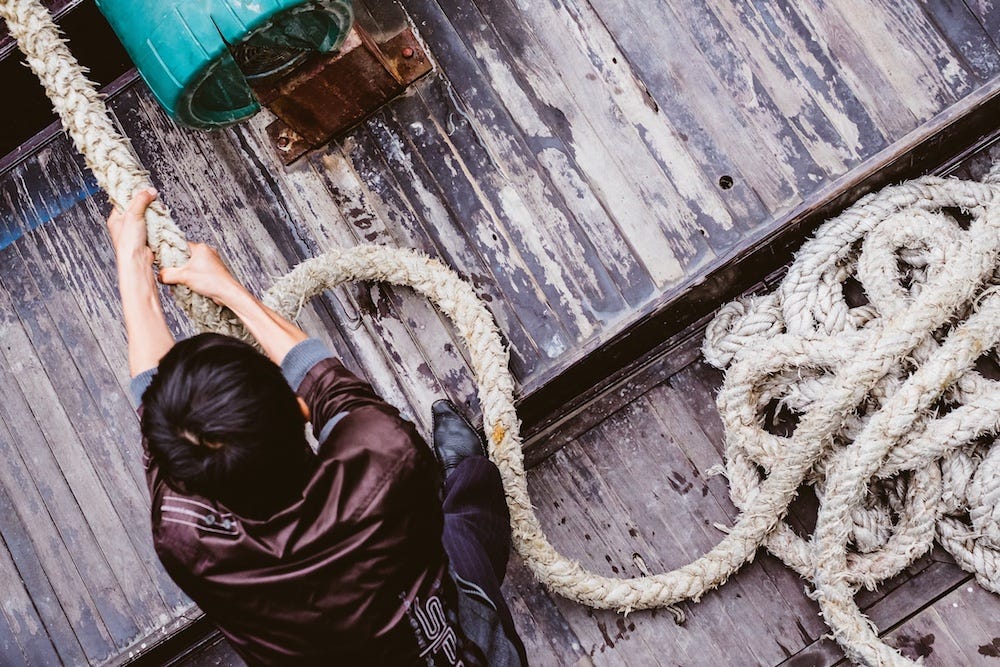
Most of the things y'all own are not assets. They are liabilities. If you lot are ready to regain command of your life and have financial and personal liberty, adopting a more minimalistic approach to life volition serve you well.
As Joshua Fields Millburn and Ryan Nicodemus say at the cease of their documentary, Minimalism,
"Love people and use things because the opposite never works."
It's time to start prioritizing life over work. It's time nosotros start living intentionally, grounded in our decisions, resisting the pull of modern society to tell us what nosotros should practise or who we should exist.
You lot are already yous and that is enough. You are enough. Thanks for being y'all.
Get Deeper
Are you fix to wake upwards, get more than focused, and notice more happiness in your life?
If so, sign upward for my free 5 24-hour interval Mindfulness Email Course. I'll exist sending you an email every twenty-four hour period that will assist you lot reduce stress, increase focus, and observe more happiness!
If you are set up to take back control of your life and start living above stress and overwhelm…
Sign Up Here!
One last thing…
If you liked this article, please requite it a few Claps so other people will run into it here on Medium.
Source: https://medium.com/personal-growth/what-you-own-owns-you-minimalism-for-people-who-love-things-5a083a7e14f3
Post a Comment for "Why I Wont Own a House Again"